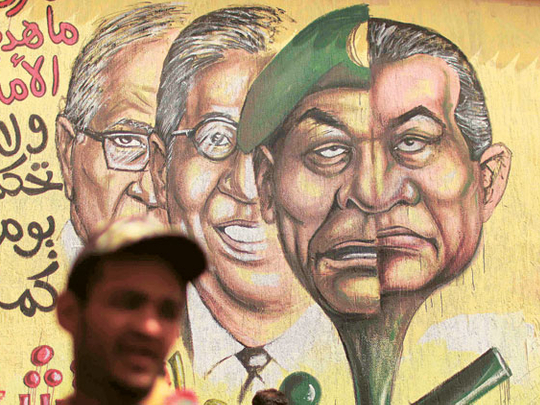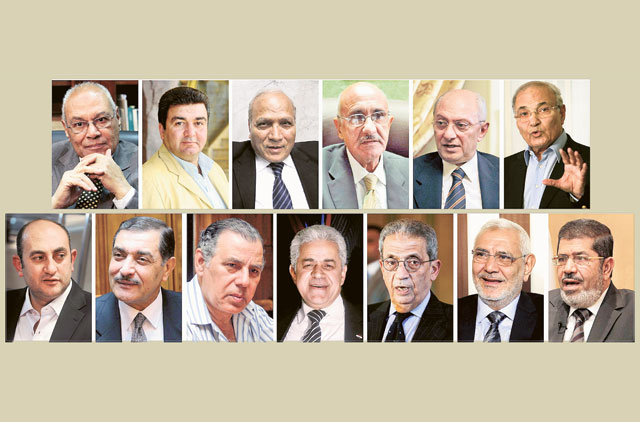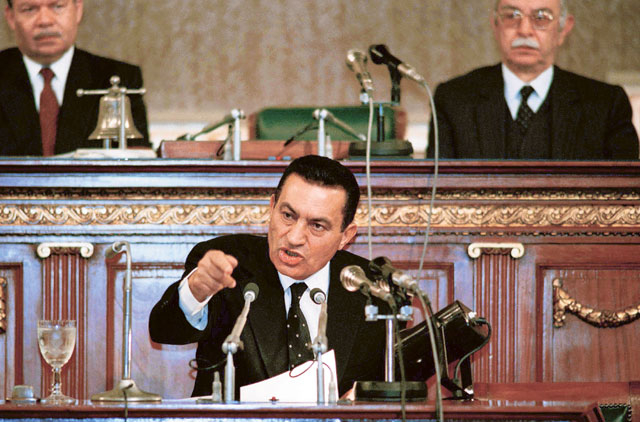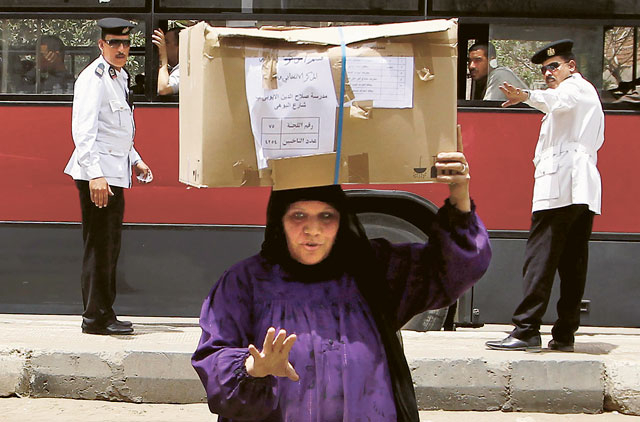
Cairo: Egyptians went to exercise their franchise yesterday in what is being widely seen as the country's first real competitive presidential election. In a sharp contrast to the 2005 presidential polls dominated by former president Hosni Mubarak, the current election is too close to call.
Having ruled Egypt for 24 years, and due to pressure from the US, Mubarak announced in 2005 constitutional changes allowing a multi-candidate presidential election instead of the decades-old referendum.
Leaders of several opposition parties, including Mubarak's outspoken critic Ayman Nour, announced at the time they would run against the then president.
Ironically, some of the rivals made the public support Mubarak in their campaigns and even promised to step down for Mubarak if they happened to win the top job.
State media and business tycoons, closely connected to the regime, launched massive campaigns for Mubarak whose posters were ubiquitous across the nation.
Mubarak unsurprisingly swept the election, winning 88.6 per cent of the votes, with Nour trailing second with 7.5 per cent, according to government figures. The win ushered Mubarak into his fifth term in office. Months later, Nour was detained and put on trial on charges of forging official documents submitted to license his political party Al Ghad (Tomorrow).
Nour and his supporters said the case was politically motivated for his vociferous criticism of Mubarak and his younger son, Jamal.
The opposition claimed that Mubarak was grooming Jamal, a Western-educated banker, to succeed him. Nour, a diabetic, was later released on health grounds after spending nearly four years in prison.
"I'll continue to serve Egypt until the last breath in my chest," Mubarak told the parliament in 2010, signalling an intention to seek a fresh term after his fifth tenure was to end in September 2011. However, he was forced to step down by a popular revolt.
Mubarak, now 84, is being tried on charges of corruption and involvement in the killing of more than 840 protesters. He is waiting for a verdict and is under arrest at an army medical centre near Cairo.
A bid by Nour, 48, to run for president this time was invalidated over his conviction in the Mubarak era.
One month after Mubarak's overthrow, Egyptians voted in a public referendum for a temporary constitution that, among other things, reduced the presidential tenure from six years to four with a two-term cap.
Political ideology
"The next president, regardless of his name, political party or ideology, will be a president for all Egyptians, not only for the majority that have brought him to power," said Hassan Nafae, a political science professor.
"To enable the new president to undertake the uphill tasks at this delicate phase in Egypt's history, all the Egyptians should allow him a relatively long time of calm, which in my view should not be less than 100 days, so that he will be able to put things in order and embark on fulfilling his electoral programme," he added. Thirteen candidates are competing to be Mubarak's successor. Several of them were among Mubarak's vociferous opponents such as the dissident moderate Islamist Abdul Moneim Abu Al Fotouh; the Muslim Brotherhood's candidate Mohammad Mursi; the nationalist contender Hamdeen Sabahi; and reform-minded judge Hesham Al Bastawisi.
Two others, however, were Mubarak-era officials, namely Amr Mousa, a former foreign minister; and Ahmad Shafiq, Mubarak's last premier.
The country's military ruler, Field Marshal Hussain Tantawi, has pledged to hold fair and free elections. The army will be deployed across Egypt's 27 governorates to protect an estimated 13,09 polling stations.
The balloting will be overseen by around 14,500 judges, according to the election commission, which was not the case in the 2005 election.
"Fears about rigging elections are legitimate in Egypt, a country which for long years knew nothing but systematic fraud as a way of ruling," said Nafae.
"However, I think I don't exaggerate by saying that the entire world is following closely the Egyptian presidential election. Therefore, I rule out the possibility of massive rigging, because any such act will be like committing suicide," he added.
Observers expect a high turnout during the first round of the vote with the frontrunners being at pains to emerge with an outright majority. But with vote splits being a big possibility, the top two contenders will have to battle it out in a runoff scheduled for June 16-17.
"The best thing about this election is that the final result cannot be predicted in advance," said Hanan Abdul Fatah, a political analyst.
"The majority of voters have not decided yet on their favourite candidates, as the latest opinion polls have shown. It is also impressive that the contenders are trying hard to lure voters with their capabilities and readiness to be brought to account," she added.
"Probably the only gain made by the revolution so far is that politicians have become aware of the people's power."














